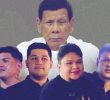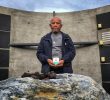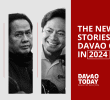By Tony M. Manaytay
Initiative for International Dialogue
PRESIDENT Xanana Gusmao may have prophesied when he told fellow East Timorese four years ago that �raising our flag will not mean that malaria will suddenly disappear, or that domestic violence will suddenly end, or that we all will have enough food, education, electricity, roads, or jobs. We dreamed of independence, but now we dream of development and of being a developed nation.� Those words can never be more relevant at present as the world’s tiniest and youngest nation is thrust again into socio-political turmoil threatening to rip the fabric of the nation – this time from within not from without.
�When it bleeds, it leads�
“If it bleeds, it leads” this was the cruel moniker newspapers and news bulletins often associated pre-independence East Timor. Yet, barely four years after independence, East Timor is again bleeding. Only this time, East Timorese and observers alike would ask: Where will all this eventually lead to?
Violence erupted in Dili, the sea-side capital of Timor Leste, two months after some 600 soldiers mostly from the Western part of the country were sacked last March after they deserted their barracks in protest over the alleged discrimination and over-zealous surveillance of soldiers coming from the the Western part of the country. The fledgling East Timorese Army has about 1,500 regular soldiers and 1,500 reservists. Most of its core officers and rank and file are reportedly recruited from the so-called East which was the bastion of resistance against Indonesian occupation then.
Observers considered the recent violence as the worst in East Timor since its break from Indonesia in 1999, when revenge-thirsty Indon militias went on a rampage, killing nearly 1,500 people. The country became fully independent in 2002 after two years of U.N. administration, but remains one of the world’s poorest.
The fired soldiers, who claim they were discriminated because they are from the country’s west near Indonesia, led days of demonstrations which ended in a bloody riot last April 28 after violently dispersed by police and regular army � majority of whom hailed from the east. They left for the mountains after the incident and threatened to wage a guerilla war.
The brutal response to the demonstration prompted a number of heavily armed military police, led by Australian-trained Major Alfredo Reinado, to leave the capital. Reinado says he did not want to get caught up in the “illegal use” of the army. The two groups refused to lay down their weapons and holed up outside the capital.
When ordered by the government to surrender, the �rebels� instead called on the Army to disarm, and for an investigation into their grievances. As street gangs fought running battles over east-west island rivalries through the suburbs of Becora and Fatuahi, the rebels launched attacks against the military headquarters at Taci Tolu, 6 km from Dili. The civilian government appeared to have been paralyzed with rumors of dissension between the fast-becoming unpopular Prime Minister Mari Alkatiri and President Xanana Gusm�o.
In the �near-total absence of law and order�, the Timorese government’s security forces were firing on one another.� On the morning of May 25, regular soldiers fired upon the police barracks in Dili for an hour or more, apparently in retaliation for what may have been an accidental shot from a policeman earlier in the day. Reports indicated that 12 policemen were killed; more than 20 others were wounded, along with two U.N. police advisers.
With an apparent collapse of peace and order, the government formally requested an international intervention force to help restore order. Foreign Minister Jos� Ramos-Horta went on Australian TV, asking for troops “to prevent the country sliding into further chaos.” New Zealand, Malaysia and Portugal, as well as Australia, agreed to send troops. By the weekend, 150 Australian special-forces commandos, the vanguard of a 1,300-man deployment, had secured the Dili airstrip and occupied the police barracks in the city center; two Australian Navy ships lay at anchor in the harbor.
Undeterred by the presence of foreign peacekeepers, gangs of youths still rampaged through the streets, and, according to the� officials of the relief group World Vision International, threatened to attack compounds housing refugees who had fled the fighting. The rampage continued as young men armed with machetes torched dozens of homes in Dili, causing women and children to flee screaming.
In a bid to defuse mounting unrest, President Gusmao took control of the country’s national security and defense to �prevent violence and avoid further fatalities� and as well as for the �rapid re-establishment of public order�. The whole country was put under emergency rule for the next 30 days.
Too early, too soon?
There is no doubt that when Timor Leste was born as a nation, it also started off at the bottom of the heap with its economy in tatters and remained to be so after four years. And the request for foreign troops to restore peace and order, or a semblance of it, just a year after the departure of the last international peacekeepers raises doubts about the long-term prospects of the world’s youngest nation.
Perhaps, four years are too short a period for the Timorese to completely learn the ropes of governance under the tutelage of the United Nations. East Timor was placed under the supervision of the United Nations Mission in East Timor (UNAMET) after the 1999 independence vote where 78.5 per cent of the East Timorese rejected the proposed autonomy under Indonesia and begin a process of transition towards independence.
Later, the United Nations Transitional Administration in East Timor (UNTAET) was established as an integrated, multi-dimensional peacekeeping operation fully responsible for the administration of East Timor during its transition to independence in 2002. The UNTAET’s mandate was to provide security and maintain law and order throughout the territory of East Timor; to establish an effective administration; to assist in the development of civil and social services; to ensure the coordination and delivery of humanitarian assistance, rehabilitation of humanitarian assistance; and development assistance; to support capacity-building for self-government; and to assist in the establishment of conditions for sustainable development.
The apprenticeship under UNTAET may not be enough for the East Timorese to completely grasp the art and science of governance but it should be to their credit for running their government under their own circumstance. It is totally unfair, if not being insensitive, to use the recent events as gauge of their fitness to have their own government.
Though it is understandable when Australian Prime Minister John Howard commented: �The way in which the country has been governed in the last few years has left a lot to be desired. They got their independence perhaps earlier than they were ready.” This could very well be a subtle variation of what former Australian Prime Minister Gough Whitlam said in 1974 that an independent Timor would be an �unviable state and a potential threat to the area.� In fact, Australia, with its covetous eyes on the oil-rich Timor gap, has the distinction to be the first and only foreign country to have recognized Indonesian annexation of East Timor in 1976.
But other observers appeared to be too eager to say their two-cents piece on the situation. Loro Horta, a former adviser to the East Timor Defense Department, offered his apprehension on �how best to salvage the country’s tumultuous experiment with independence.� (emphasis supplied) This only goes to show how little did other people value the hard-won East Timor independence � an independence that cost some 200,000 East Timorese lives � by looking at their journey to carve their own place in the community of free nations as mere �experiment with independence�. Interestingly enough, this comment impressed upon us that there is still prevailing pro-autonomy sentiments among East Timorese within the establishment
Narrowing the ‘gap’
By readily sending its troops to the troubled East Timor, Australia had also accomplished the narrowing of the gap of the oil-rich �Timor Gap� in the process.� The economics of sending �peacekeepers� can’t simply be ruled out considering Australia’s precarious legal claim over Timor Gap after East Timor finally won its independence from Indonesia.
More than 2,000 international forces, some 1,300 of them from Australia, have been deployed to restore order. Interestingly enough, Australia has suggested a semi-permanent contingent may be needed in the country in the long term.
Through East Timor’s domestic problems, the Australian government has found a leverage to keep the country’s leaders, who were so vocal on the country’s rightful claim over the disputed Timor Gap, on the line and preserving its economic interest over the disputed area.
Although , it is not accurate to say at this point that there was a covert effort to exploit the simmering ethnic rivalries and tensions to justify the sending of troops to the beleaguered East Timorese government. The desertion of Major Alfredo Reinado, an Australian-trained East Timorese police officer, from his post and led the �rebels� could hardly even put an Australian hand into the scene and subsequent breakdown of peace and order. Reinaldo had claimed his own reasons for his actions.
What is evident, however, is that the longer the Australian troops will stay in East Timor, it would be more strategically advantageous to the Australian government than the host country.
Forgive, but not to forget
“Let us build the nation from ashes once again,” President Gusmao told a group of male and female police, some of whom had tears in their eyes, a day after he took control of the country’s security forces with East Timor placed under emergency rule. The decision to give Gusmao emergency powers was arrived after a meeting with Prime Minister Alkatiri and the President of the Parliament.
It was like deja vu as the same call reverberated some four years ago when East Timor joined the community of nations. Only this time the country is not smiling as it was when the country’s independence was formally declared in 2002.
In fact, after the declaration of independence, government leaders were beginning to be pre-occupied in establishing friendly relations with its giant neighbor and former occupier. Commenting on the results of the three-year investigation conducted by Commission for Reception, Truth and Reconciliation (CAVR), Ramos-Horta was quoted saying that “the purpose of the report is not to finger-point Indonesia,” but to “look at the past, understand the past so this sort of violence will not happen again.” Also, Gusmao was equally magnanimous and diplomatic when he told UN Secretary General Kofi Annan that � the essential issue is to remind not only our future generation not to commit all that happened again in East Timor, but also to remind the international community to try everything that it doesn’t happen again elsewhere.�
This was a 180-degree turnaround for these two leading Timor resistance leaders who were strongly pressing for justice from Indonesia on the crimes committed against East Timorese during its 24-year occupation. The realities and conditions had definitely changed � with former resistance leaders now at the helm of government � and the exacting demand of governance and international politics have definitely changed the perspective viz-a-vis the injustices committed based on pragmatic considerations.
The people’s demands may appear to be very simple to most East Timorese leaders which is �to change their conditions of life”. The people’s expectations that somehow their lives will improve under the new environment were simply too high, which is normal for a country where poverty is widespread and unemployment is a record-high of 80 percent especially among former resistance fighters. But alongside there is that silent demand for justice and restitution. Indeed, the tempest now raging in Dili could also be precisely attributed to the unanswered cries for justice and more so the papering over by the country�s leaders of this fundamental need for the more convenient reconciliation call.
The recent attack on the Attorney General’s office could be read as an expression of the people’s frustration and disappointment on their demand for justice. During the attack, the mob armed with machetes ransacked the office including the area where evidence of 1999 massacres committed by militias allied with Indonesia was kept.� Around 1,500 people died at the hands of the Indonesian military and pro-Jakarta militias after East Timorese voted overwhelmingly for independence. Dozens of low-level militiamen have been jailed in East Timor, but most of the leaders fled into exile and now live freely in Indonesia. And the Indonesian generals and other foreign conspirators of the invasion and occupation and its attendant atrocities are enjoying impunity for their crimes against humanity. The documents which have never been publicly released remain a symbol of the traumatic period.
Thus, the call for reconciliation with the former oppressor may not be that easy at all for a people who have suffered so much. It is safe to say that the clamor for justice remains prevalent among civil society , the grassroots communities, families of the victims and survivors of all the crimes during the 24-years illegal occupation. Compounding the situation is the failure of the government to inform the public on the content of the CAVR report and recommendations to the United Nations especially to those who suffered most from the atrocities committed by Indonesia.
An illustrative case might be of help for us to get a glimpse on a peculiar concept of justice some, if not most, East Timorese have. A woman had lost a brother during the recent incident. In an interview with foreign newsmen, the woman said, �He died because of the government. They should have responsibility for this case, because my brother was not involved in it at all�none of these things that have happened.” She added that those responsible should be held accountable. Otherwise, “the people will do the justice.”
Political tinderbox
Loro Horta, former adviser of East Timor defense department, offered the following opinion: �There are many factors underlying East Timor’s political tinderbox: regional and ethnic rivalries, political factionalism, unemployment and a culture of violence stemming from 24 years of brutal Indonesian occupation. But some argue the real trigger to the violence was the dubious circumstances behind the re-election of Prime Minister Mari Alkatiri as secretary general of the ruling Fretilin party.
More significantly, perhaps, Alkatiri has implemented a foreign policy overtly confrontational to the West. His recent decision to hire nearly 500 Cuban doctors after visiting that country, despite strong objections from the US ambassador, was highly controversial and oddly aligned East Timor with the resurgent leftist movement gaining ground in Latin America.�
Well said. But these factors of the so-called �political tinderbox� are not exclusive to East Timor. A number of under-developed nations elsewhere also share the same predicament but do not behave the way East Timor does. And to suggest that Alkatiri’s resignation or removal from office through other means other than the electoral process will partly solve the problem might not be strategically tenable (though his departure from the scene may help alleviate immediately the situation). That to remove him, Alkatiri doing it voluntarily or otherwise, ahead of the scheduled 2007 elections may prove even more costly, at least politically, in the long run and will set unenviable precedence for a young country with equally young and fragile institutions.
However, a careful reading of President Gusmao’s address to the nation last March 23 � a week after some 600 soldiers were sacked � is instructive in putting everything in proper perspective. The President proved once again that he is on top of the situation by correctly identifying the problem to be a political one. His admonition to the defense people �to carefully look into the problem… that the issue of �Loromonu-Lorosa�e was a political one and it was a problem which had long existed within F-FDTL, therefore there was a need to resolve it carefully� (underscoring supplied) clearly indicated his thorough understanding of the problem.
Only that the President did not go deeper into the issue when he failed to acknowledge that the problem in F-FDTL was not only political. A closer reading into the situation will reveal that the country is having a problem of a politicized F-FDTL, which could be explained by the fact that most of these F-FDTL members were former freedom fighters. In fact, it was brought to President Gusmao’s attention that a �former Veteran F-FDTL from western part of TL� had joined the Democratic Party, the opposition party.
The situation is further compounded with President Gusmao’s assuming the role of a �father� to all East Timorese. This �father� figure role that the President consciously assumed can be readily sensed by his own ambivalence on the issue of dismissed soldiers when he said, �I would like to explain that the decision taken by the Brigadier-General Taur� Matan Ruak to consider 591 soldiers to be civilians is his real competence and it is not the President of Republic who is going to change it� and yet at the same time publicly admitted that �as the President of Republic I found that the decision taken by the Brigadier-General was incorrect, and it was not really just!�. There is apparently a lack of properly distinguishing the �legendary resistance leader Gusmao� from a �President Gusmao�, which may put pressure on the newly-established and fragile institutions in the government like the military.
It is evident that the country is experiencing a problem of having both its political and military leadership in transition � from former resistance fighters to being now in the position of government saddled with a myriad of domestic concerns of governance to make the new state viable in a fast-changing international environment and globalizing world. Also, the infant government is being put in a dilemma how to balance the people’s cry for justice and restitution from the atrocities committed by Indonesia and the need to establish �friendly relations� with its giant neighbor in the post-independence era.
Returning to Loro Horta’s clich� of �East Timor’s political tinderbox�, it is clear that the country’s� real �political tinderbox� is East Timor itself.
Picking up the pieces
In the light of the recent events, it is relevant to revisit UN Secretary General Kofi Annan’s words four years ago as thousands of East Timorese danced in the streets as the country formally joined the community of free nations: “Independence is not an end. It is the beginning of self-rule, which requires compromise, discipline, unity and resolve. While you have succeeded in one challenge, winning your independence, this only paves the way for many more.”
At the height of the recent turmoil, the UN Secretary General again asked the East Timorese, in a video message, they should not let anyone deprive them of their “hard-won freedom” and reminded them that following the country’s arduous road to independence, the world and East Timorese had believed that resorting to violence for political ends was “a thing of the past.”
No matter how �disappointing� the recent events could be, as UN Secretary General Kofi Annan put it, the world’s youngest and most fragile nation is not a �hopeless case� after all. (UN research showed that countries that survived the conflict era will likely have recurrence of conflict within 5 years of post-conflict period) Their most recent history proved to the world that they are capable of rising from their own lot of being an oppressed and� conquered people to being free and independent, no matter how costly it maybe.
The immediate list of doables at present may include the need of humanitarian aid for the displaced people because of the recent violent incidents. Sukehiro Hasegawa, the UN special representative in Dili, reported that� some 65,000 people who had fled their homes were staying at 35 camps around the city. Clearly, this indicates a humanitarian crisis by which various international humanitarian aid organizations had already responded.
Though the situation has stabilized but it remains to be fragile. As reported, the country’s young security force has lost its capacity to restore order which necessitates the presence of the UN Peacekeepers with a definite timetable for pull-out. Australia’s assessment that there is a need for a prolonged tour-of-duty� by foreign troops to restore and maintain order may be considered but with definite intervention plan formulated in close coordination with their local counterparts and under the command of the UN and not of Australia.
To prevent other �groups� who may exploit the sentiments of the dismissed soldiers, as pointed out by President Gusmao, it is imperative that an independent investigation by a competent body should be conducted immediately with its reports and recommendations be made known to the public. The process of reconciliation cannot proceed with much success without looking deeply into the issues surrounding the dismissal of some 600 soldiers.
On the long term, there is clearly a need for a comprehensive intervention to strengthen existing government institutions and the professionalization of the defense unit. Maybe, the government can look into developing a package of a retirement program for some veterans of F-FDTL as a first step of professionalizing its armed forces. It is of help if the role of �foreign advisers� in the different government institutions should be limited to providing advise without giving them the power to decide.
Mainstreaming of civil society’s role in conflict prevention and nation building seem to be the most logical answer to a government in transition. With most of the East Timorese having used to being part of decision-making during the pre-independence period, the opening of the venue for greater people’s participation through their legitimate civil society organizations may prove to be invaluable. At the same time, mainstreaming civil society processes and the institutionalization of their role in post-independence East Timor may provide a sense of check on their government.
Bishop Ximenes Belo’s words after the 1999 independence vote rings more relevant at present when he said, �Working for the common good of every East Timorese and for East Timor as a nation means new structures, new vision and new processes whereby a fractured society can be reconstructed as truthful and just.� (italics supplied)
As a general strategy, the cure to East Timor’s fragile democracy is democracy itself. �#










